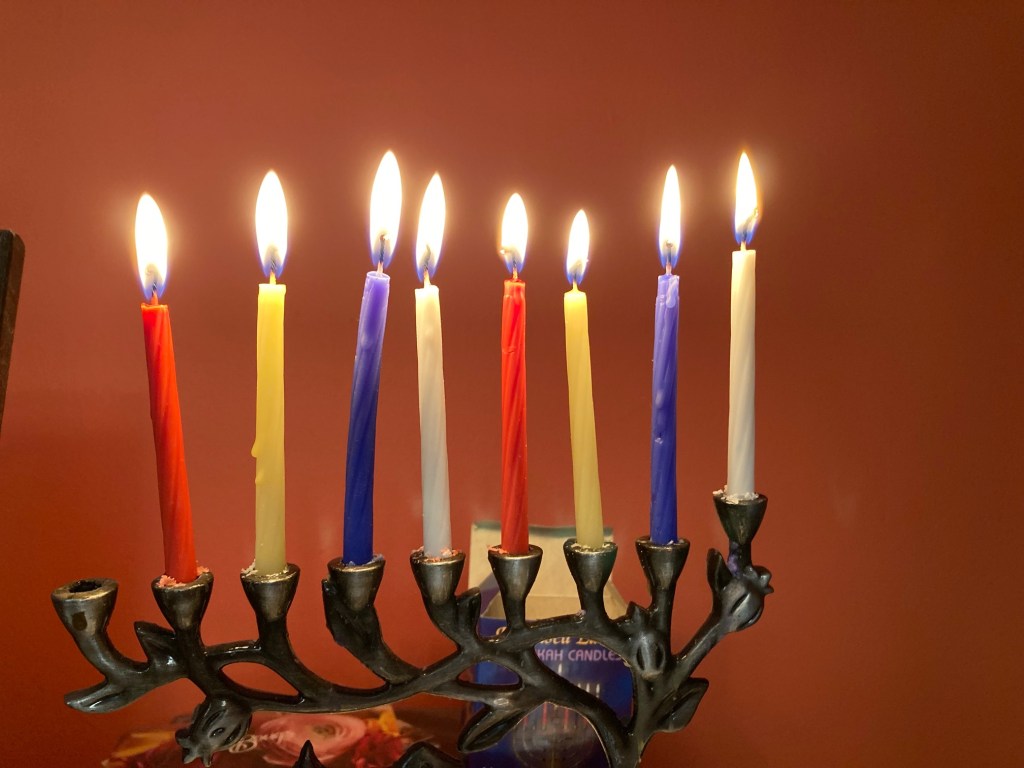For my birthday this year, my mom offered to figure out how to add streaming to our regular TV, so that we could finally get Netflix and find out what everyone’s been talking about. Up to now we’ve only been able to watch streaming channels (like Hoopla and Kanopy, which we get free from our library) on our computers or phones, so it didn’t seem worth the extra expense to pay for Netflix. But Mom was determined to try, and she ordered a Roku device, and spent two very frustrating days setting it up (I would have given up in two seconds) until it was all connected and working. Then my brother got me a few streaming channels for my birthday, so now we have Netflix and Britbox and Roku’s free movies on top of the two streaming services from our library. And then there are the channels I’m supposed to be able to move over from cable into streaming, so that the shows will be available whenever I want instead of just when they are scheduled, but I’m not sure my brain has the bandwidth to figure out how to make that happen, and I’m already overwhelmed with so many options I can barely see straight.
It took us forever to look into a device to add streaming to our TV, mostly because I was sure it would be expensive, and require a smart TV, and add ten times more stress to my life; just like I waited forever to switch from my flip phone to a smart phone, because I was overwhelmed with all of the new skills I’d have to learn, and all of the decisions I’d have to make. But my smart phone has turned into a wonderful companion, and I think the Roku will probably be the same, eventually.
My first priority when the Roku was connected, and Netflix was added, was to start watching Shtissel – an Israeli TV show about an ultra-orthodox family in Jerusalem. I’d seen two episodes a few years ago, on YouTube, with only Hebrew subtitles, so now I could watch the whole series, with English subtitles to fill in the gaps where my Hebrew and Yiddish skills failed me. But as soon as I went looking for Shtissel, I found a ton of shows people have been recommending for years, and I had to fill up my watchlist before I could focus on watching any actual shows.
Then I went through Britbox and ended up putting most of those shows on my watchlist too – because I’m a sucker for a British mystery, but also because even on the large screen I can barely read the show descriptions, so I added a lot of shows without really knowing what they’d be about, just assuming it’s a British mystery, so it has to be good. We’ll see how that goes.
Of course, now I’m eyeing those channels I don’t have yet (apple+, Prime Video, Hulu, etc.) because I keep seeing ads for shows I can’t access, and it is insanely frustrating, and then I get overwhelmed with all of the options, and wish I could go back to only having two hundred or so channels to choose from.
But I am, gradually, getting used to all of this. I’ve even learned how to juggle the three TV remotes we need now, one for cable, one for Roku, and one to switch back and forth from Roku to cable.
My mom, who got all of this set up, says she is flummoxed by the three remotes, and all of the options, and leaves it to me to make the decisions about what to watch and when. She tells me that the Roku was a present for me, not for her, so she will happily watch whatever I choose. But I know that, eventually, she will find a streaming channel devoted entirely to quilting or photography, and I will be unable to convince her to hand back the remote controls, so I am doing my best to get on board and watch all of the shows I like now, before it’s too late.
If you haven’t had a chance yet, please check out my Young Adult novel, Yeshiva Girl, on Amazon. And if you feel called to write a review of the book, on Amazon, or anywhere else, I’d be honored.
Yeshiva Girl is about a Jewish teenager on Long Island, named Isabel, though her father calls her Jezebel. Her father has been accused of inappropriate sexual behavior with one of his students, which he denies, but Izzy implicitly believes it’s true. As a result of his problems, her father sends her to a co-ed Orthodox yeshiva for tenth grade, out of the blue, and Izzy and her mother can’t figure out how to prevent it. At Yeshiva, though, Izzy finds that religious people are much more complicated than she had expected. Some, like her father, may use religion as a place to hide, but others search for and find comfort, and community, and even enlightenment. The question is, what will Izzy find?



















